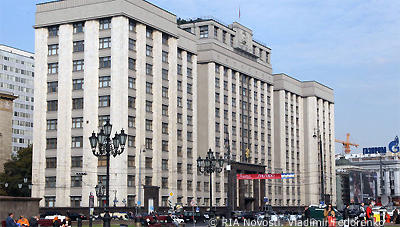OBITUARY: Gennady Seleznyov, night rider of Russia’s rowdy parliament

(Business New Europe – bne.eu – Nick Allen in Berlin – July 23, 2015)
With President Vladimir Putin’s executive fist dominating the ‘vertical of power’, while parliament toes the Kremlin line, it’s easy to forget Russia’s heyday of real rough-and-tumble oppositional party politics in the first years after the Soviet collapse.
So defiant from the outset was the legislature, still known after 1991 as the Supreme Soviet, that it was finally shelled into submission by President Boris Yeltsin in 1993 as he drove the country’s shift to a market economy.
But what seemed like the final destruction of legislative power gave rise to a vivid and meaningful – if often shambolic – new assembly. Formed from a volatile mix of factions, agendas and personalities, it needed a firm hand on the reins to prevent Russia’s new State Duma being confused with the state circus.
After Ivan Rybkin’s two-year tenure as speaker, this task fell in January 1996 to Communist Party member and former editor of the Komsomolskaya Pravda newspaper, Gennady Seleznyov, who died on July 19, at age 67, after a long illness.
Riding the Duma-coaster
Born in 1947 in the Urals town of Serov, Seleznyov nurtured a love of horses and riding on his path from lathe worker to army conscript, journalism student and editor, to the man charged with breaking in the country’s most recalcitrant parliament.
“There were always stables in my life, working horses: me and the boys used to love standing in for the grooms at night and taking the horses off for a ride,” Seleznyov wrote.
He rarely got an easy ride in the parliament. During his two terms as speaker from 1996-2003, Seleznyov “patiently admonished lawmakers like rowdy schoolchildren, sometimes telling them to step outside to settle their differences”, according to the The Moscow Times.
Reliably unruffled but seldom seen outside the chamber without a cigarette in his hand or mouth, Seleznyov flavoured proceedings with his characteristic dry wit. “All of our multifaceted lawmaking activity … boils down to the law on beekeeping,” he said in a 1999 speech summarising the results of the preceding four years of the Duma’s work.
A Western journalist who reported from the lower house in the late 1990s described the Duma as a far more colourful place than it is today, because the pro-Kremlin parties had not yet established complete dominance.
“There were lots of hard-line Communists, people going on hunger strike in their offices in protest at government policy, and of course, [ultranationalist] Vladimir Zhirinovsky with his brawling and shouting in the parliament chamber,” he wrote. “Seleznyov presided over it all with a mixture of wry amusement and exasperation,” and with “the air of someone who could see the ridiculousness of it all”.
Rich with ridiculousness, but not ridiculous of itself, might be fairer to say of this very Russian-flavoured plunge into Western-style parliamentary politics: The Duma-coaster that twisted and turned towards Putin’s ascendancy to presidential power in 1999 was a necessary ride: it was a coming of age for a society emerging from 75 years of totalitarian rule, like a rebellious adolescence steeped in heady farm cider, and a process that through its very chaos marked the assembly’s rite of political passage.
The Duma also provided a valuable counterweight at times to the Tsar-like impulses of Yeltin’s presidency. Seleznyov as speaker personally protested against many of Yeltsin’s reforms, while his party outright rejected some, such as the proposed complete denationalisation of land in 1998. When Prime Minister Sergei Kiriyenko opened the markets, Seleznyov objected, saying the Russian economy wasn’t ready yet.
But some critics of the speaker say he later yielded to Yeltsin’s direct pressure not to encourage the Duma in its planned impeachment vote against him over the war in Chechnya and the “genocide of the Russian people” through harsh reforms. The impeachment failed at voting, but in 1999, the Communist Party again took the largest number of seats and Seleznyov was re-inaugurated.
Saddling up for change
Everything changed with Yeltsin’s handover over power to Prime Minister Putin on New Year’s Eve 1999, and the ex-KGB agent’s subsequent election as president on a wave of support for the second war in Chechnya.
This flagged the end for the old guard of Duma stalwarts, Communists included. After the party lost many seats in the Duma in 2001 Seleznyov wanted reform within its ranks, while the Communist leadership called for his ousting as speaker. He refused to go, was expelled from the party but stayed in the chamber’s top seat for another two years.
Seleznyov lost his speaker position after the pro-Kremlin United Russia party won a majority of seats in the 2003 elections. While he was an early supporter of Putin, he was scathing about the new Kremlin-subservient Duma chaired by the dour former interior minister Boris Gryzlov: “All the deputies did was click their heels and say ‘Yes Sir!’ It was simply repellent to watch this. Some kind of barracks and not a parliament,” Seleznyov said.
Although regarded by many as “one of the founding fathers of modern Russian parliamentarianism”, Seleznyov “could not adapt to the new realities”, political scientist Konstantin Kalachev told gazeta.ru. After founding his own party but failing to win re-election as an MP in 2007, Seleznyov saw out his working life as board chairman of a bank in the Moscow region.
As many remarks on his passing shows, he is remembered for his measured control of the parliamentary helter-skelter, steady wit and consistent principles. “He stood at the pinnacle of politics in the toughest years of the rule of Tsar Boris, and was able to create parity between the authorities,” wrote one internet commentator. “He knew how to reconcile both the left and the right, and I loved his intelligent humour, but the main thing was his decency and statesmanship.”
Gennady Seleznyov is survived by his wife and son.
